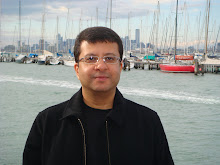Last Tuesday, Apple sued HTC, the Taiwanese company that is the largest maker of smartphones running Google’s Android operating system, including the Nexus One, designed and sold by Google. In the lawsuit, Apple said that HTC phones running Android violated 20 of its patents, including those relating to the iPhone’s ability to recognize the touch of multiple fingers on its screen at once.
Why is Apple filing a Patent infringement lawsuit against HTC, the largest maker of Google's Android-based smartphones? What will it take to unseat Apple's iPhone as the dominant smartphone?
It is useful to consider the iPhone-Apple vs. HTC-Android battle as a battle of competing "networks" or "ecosystems" (I will use these terms interchangeably below). By this I mean the combination of hardware-software that the iPhone-App network offers and the combination of hardware-software that HTC-Android-Apps network offers. It is also important to note that HTC is one of a number of hardware (smartphone) providers that are compatible with Android and Android-compatible App software.
This battle has parallels with the battle that was fought fifteen years ago with Apple-Macintosh on one side and Wintel (Windows+Intel) and PC makers like Compaq on the other side. In that battle too, Apple was the first mover and arguably had better hardware. However, because the ultimate utility and success of these products involves complimentarity between hardware and software, the fact that Wintel (the choice was actually made by IBM back then) had an "open-architecture" --implying that anyone could write software for Windows and produce hardware compatible with Intel microprocessors -- led quickly to the development of critical mass in terms of software and low prices on hardware for the PC side. The market tipped decisively toward the PC with Compaq's adoption of the 386 Intel processor, and eventually the Windows-Intel-PC ecosystem became dominant. Apple's computers have been trying to expand beyond a 15% market share ever since.
This battle has parallels with the battle that was fought fifteen years ago with Apple-Macintosh on one side and Wintel (Windows+Intel) and PC makers like Compaq on the other side. In that battle too, Apple was the first mover and arguably had better hardware. However, because the ultimate utility and success of these products involves complimentarity between hardware and software, the fact that Wintel (the choice was actually made by IBM back then) had an "open-architecture" --implying that anyone could write software for Windows and produce hardware compatible with Intel microprocessors -- led quickly to the development of critical mass in terms of software and low prices on hardware for the PC side. The market tipped decisively toward the PC with Compaq's adoption of the 386 Intel processor, and eventually the Windows-Intel-PC ecosystem became dominant. Apple's computers have been trying to expand beyond a 15% market share ever since.
However, Apple continues to push a "proprietary model" with its music players and with the iPhone. So far it has been very successful, partly because of its breakthrough hardware (the iPhone), partly because of its expanding universe of Apps, and partly because there has been no serious competition. Google has closely studied the evolution of the PC battle, and realizes that to compete with the entrenched iPhone ecosystem, it needs several ingredients to work in synch with each other. To have any chance with the iPhone ecosystem, the Google ecosystem will need good and cheap hardware (smartphones), a large portfolio of Apps to emerge very quickly, and good software (the Android OS). By explicitly adopting an "open-architecture" model, Google is following the strategy that is most likely to succeed, if at all. HTC and other Android compatible smartphones offer more choices than the iPhone, price competition among them is likely to bring the price of hardware down further, and the open-source aspects of the Android OS fosters easy and quick App development. The final assessment is that Google has the right ingredients to have a (long) shot at usurping Apple's dominance.
Apple undoubtedly realizes that the Android ecosystem has the right ingredients for a replay of the PC debacle (from Apple's point of view). Therefore Apple needs to fight along multiple dimensions: hardware, software and Apps. Apple is doubtless probing for chinks in the armor and the patent infringement lawsuit is probably just the first salvo in a battle that is just getting started.
The good news for us, just as in the case with the battle over the PC, is that consumers will benefit in terms of choices and prices whichever way the battle goes.
